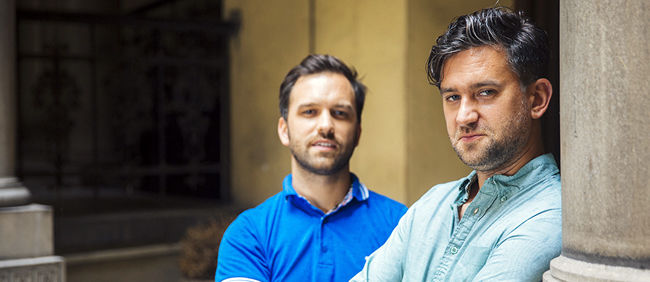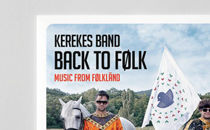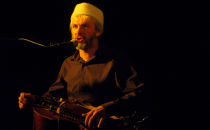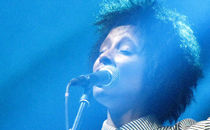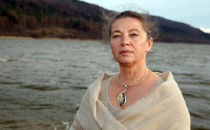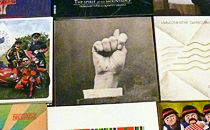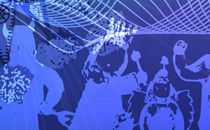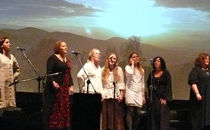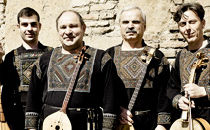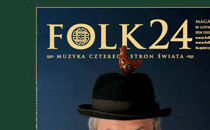How did Kerekes Band come into existence?
Zsombor Fehér: According to the official explanation, Kerekes Band was founded 21 years ago to learn and mediate the beautiful and rock-hard melodies of authentic Hungarian folk music. It also has to be mentioned that the members of the band were 16-years old then and thought that having their own band would help them pick up chicks. The truth is somewhere in between, unfortunately (or, if we’re talking about our long-term goals, fortunately) at the expense of picking up chicks.
Does the word "Kerekes" mean something?
Zsombor Fehér: Kerekes is a Transylvanian roundelay, which is danced and played by the Csángó population in Gyimes, who are professional mountain sheperds. This was the first melody I learnt playing on the flute. Kerekes is a great name, because just like the Polish language, Hungarian is also full of interesting letters. However, the word Kerekes has none of those. Therefore, it doesn’t only sound well, but is also easy to pronounce for a foreigner… :)
Please explain why you have a figure of the outlaw in your logo. Who is he?
Viktor Fehér: Actually, he’s a betyar or sheperd having a good time. The hat with a big rim and the loose pants are part of the clothing typical for Hungarian betyars/sheperds. This logo represents that Kerekes Band is mainly based on the Hungarian sheperd traditions. But, since our music is also dance music, we put the betyar in the Saturday Night Fever pose. The betyar dancing like Travolta is bizarre enough to represent the music we make. :)
You and your brother Zsombor have been playing folk music for a quite long time. Please tell me in short how your music (especially sound) evolved.
Viktor Fehér: We started with traditional folk music: we studied it, collected songs, met elderly musicians from the countryside, held dancing events. The band was already 10 years old when in 2006 we came out with our CD "Pimasz", which was chosen as Top of the World Album by the English Songlines Magazine. This album already features songs written by us. These songs are still inspired by folk music, but throughout theirs, the folk background had intertwined with the energy of rock music, the freedom of jazz, and the sound of power folk. Since then, this sound has become our trademark, which is acknowledged by both the audience and the trade. We belong to those few Hungarian world music bands who regularly attract huge masses.
I am interested in your musical education. Have any of you graduated from the Music Academy or have you studied music on your own?
Viktor Fehér: We did not learn music within the traditional school system, but it doesn’t mean we didn’t train ourselves. The Hungarian folk musical education wasn’t quite developed when we started dealing with music. Beside that, all of us went on higher education in some other fields. You know, meeting authentic folk musicians made us understand that folk music is mainly about the human soul. We learnt playing the instruments via self-teaching and with the help of elderly masters. This knowledge was later on filled up with spirit due to experiences.
How do you find traditional tunes - do you travel to the villages to learn from the old musicans – or do you search through the archives?
Zsombor Fehér: Song collectors become most successful using both strategies. The Hungarian Institute of Music Science has collected - starting with Béla Bartók’s collection - 200.000 Hungarian folk songs, from which those pentathon tunes amazed me the most, which were related to the ancient, Central Asian melodies. I kept asking the old musicians about the different variants of such tunes, and, as a consequence, I managed to record melodies never heard before. These tunes later on made their way into the Institute’s folk music database, as a part of my own collection. However, nowadays, stepping out of this circle - and stepping into a much more unique, personal one - I collect folk songs by myself. In practice, it happens like this: I’m walking on the street, whistling, and then, out of the blue, a melody is born between my teeth.
Now you are a world music group, because you combine traditional music with contemporary genres and acoustic instruments with electronic ones. What does inspire you when you compose?
Zsombor Fehér: I only go on with the composition process started on the street, if I can imagine the outcome as a Kerekes Band song. I like songs which I could also picture as a rough Jimi Hendrix-song, or a tough Rage Against the Machine tune. In my mind, I can already hear which different instruments will be played during the song, but the laboratory work begins in the rehearsal room of the band. We have three folk instruments in the band, and none of them is played the way it supposed to be. Amos plays the viola as a synthesiser, the lute sounds like a guitar in Csabi’s hands, and I play guitar solos on the flute. I am inspired by the fact that nobody has ever experimented electrifying these instruments as much as we have done so far. By the time the sound of my flute leaves the speakers, it will have already gone through 40 kilograms of pedal effects (octaver, chorus, wah, phaser, delay stb).
Recently you have released the latest CD "Back To Følk". Who came up with the idea of Følklānd? Tell us more about this fascinating country!
Viktor Fehér: Hungary has no seasides, but it is deeply rooted in the nation’s collective spirit, that during the rule of Louis the Great (Ludwik Węgierski), when there was one king ruling both Poland and Hungary, in a sense, our country was surrounded by three seas. We have been ever since longing for a sea we can call our own. This gave us the idea of making up a Hungarian archipelago. These islands can be found south of Magna Hungaria (scientist don’t know where it is even today), where the night sky is lit up by the Trotters constellation. The islands were taken over by horse-riding Hungarians. They live happily, following the way of the Saint Sparrow. This is the story in a nutshell. It is a bit of a sarcastic Hungarian mythology. Krzysztof Varga’s book, "Gulasz z turula" depicts us Hungarians almost perfectly, as we live in the present, while lamenting on the past. But, God forgive us, this is the way we are.
Have you ever thought of taking a vocalist?
Zsombor Fehér: In my opinion, a sole singer standing on stage is the most boring view ever. However, if - as a singer - you have a guitar or a mouth-organ in your hands, you have already become a musician. This is how I’ve become the singer of the band, as I always have my flute in my hands… :D We never chose the straight, simple way: everybody knows it’s much more difficult to become popular playing instrumental music without singing. We still manage to get our audiences dancing their feet off, no matter if we perform in Jamaica, or Lithuania.
You were in Poland at the Open Air Festival in 2012. What were your impressions after the show and visit in our country ?
Zsombor Fehér: That sunset we experienced on the stage of the Open’er remains unforgettable forever. One of my funniest stories is when I tried to chat with our bus driver. The whole conversation can be summed up by two sentences. I told him: ‘Polonez dobrze auto’. And he said ‘Tak’.:) It is interesting to know that entering the Polish border, my brother, Viktor and I got home, because the picturesque castle of Niedzica was built by our ancestors, the Berzeviczy family. I found it fascinating that a piece of us lives in Poland… As I know, the Embassy of Følklānd has already contacted the castle of Niedzica. :)
Do you know any Polish folk/ethno bands?
Viktor Fehér: Years ago, we got to know a local folk dance group in Przemyśl. There, we had the chance to try "góralski" dance. It was a fantastic experience. The Gyimes, or the Paloc music also belongs to the mountain people. I guess, this is why I like "góralski" music so much. The way they play the viola and the doublebass makes it really a hard rock music. It pulsates like Arctic Monkeys or AC/DC. Unbelievably energetic, tight. It’s a music to dance, too.
What are your plans for the nearest future?
Viktor Fehér: The band is rather successful in Hungary, we have achieved several golden records and Fonogram awards. The international success is much more difficult. We have given only three concerts in Poland so far, but all of them were really memorable. One of our first concerts was near Szczecin. We traveled for almost one day to get there, and then a huge storm striked on the venue. But, to our surprise, a group of hard-core fans stayed there and danced till the end of the concert.
We love Polish people, our home town, Eger, is visited by countless Polish tourists. We can truly feel the connection between Hungarian and Polish people. We hope to perform more frequently at Polish festivals and venues in the future.
Thank you for your time!
